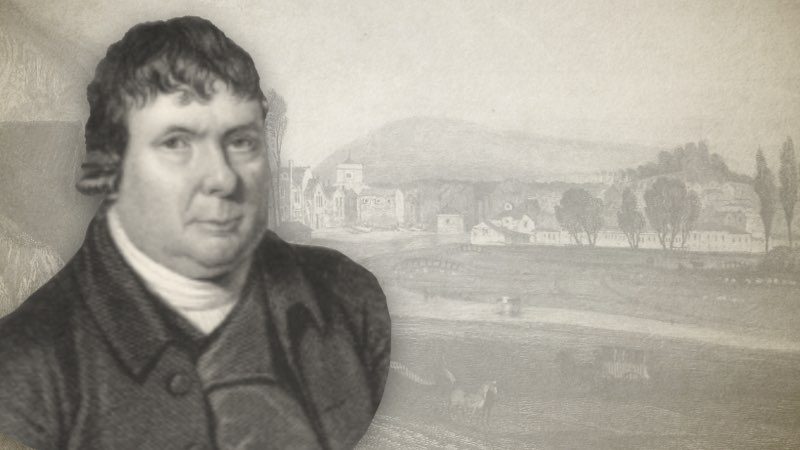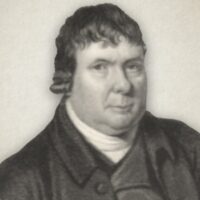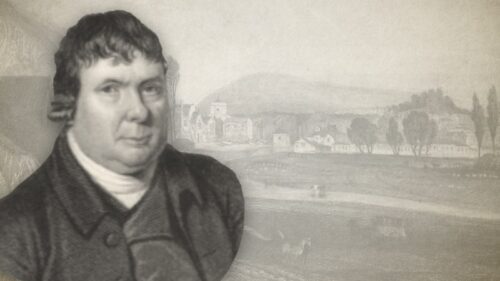
The Life And Legacy Of William Huntington
Earthen Vessel 1913:
William Huntington
Born 2nd February 1745. Died 1st July 1813.
By J. B. Lock
It is usual to commence the biographies of famous men with an account of their honourable or respectable birth and lineage. In an account of Wm. Huntington this feature must be missing. His mother was the wife of a farm labourer who received but eight shillings a week, which (as her son truly said) “is but a poor pittance to bring up a wife and family upon.” Moreover, the woman’s husband was not the father of Huntington. A parentage more lowly and contemptible in man’s estimation it is difficult to conceive. But it is written that God has “chosen the weak things of the world and things which are despised, yea and things which are not, to bring to nought things that are.” John Berridge remarked that when God wanted a successor to Elijah He went, not to the “School of the Prophets,” but to the plough-tail, and chose Elisha, upon whom a “double portion” of His Spirit rested. Not that God honours ignorance, as such, or despises those who are learned. Moses was learned in all the wisdom of the Egyptians; Paul was brought up at the feet of the learned Gamaliel; all His messengers are made “wise unto salvation,” wise in the things of the kingdom, and most of them are endowed with ability to acquire an amount of human learning sufficient for their calling, whatever the disadvantages of their early training may have been. However, Huntington was taken, not from a university, or a theological college, but from the humble occupation of a gardener, he having been previously employed as a cobbler and a coal-heaver, the last being the secular calling by which he is chiefly known, and which he most frequently referred to himself. His early education was of the meanest sort (Southey described him as “totally uneducated”) and his youthful days were passed in circumstances the least likely, one would imagine, to make an “able minister of the New Testament”; yet such he was called by the Lord to be. Though he had no educational advantages in his youth, Huntington contrived to teach himself so far successfully as to extort from Southey the unwilling testimony that “his language was remarkably free from those inaccuracies which might have been expected,” and that, “it has a vigour and manliness which can never be attained by any artifices of composition.” It was his clear, simple, forcible language which, under God’s blessing, gave him his power in the pulpit and the press; he was easily “understanded of the people.” Added to this, he had singularly clear views of the doctrines which he preached, and was almost alone in his time in the manner in which he distinguished between law and gospel, flesh and spirit, the work of man and the work of God. It was essentially as a preacher of the Gospel that he made his name, and was so much owned of God. Many of the sermons of the present day would be the better for an infusion of the simplicity of Huntington’s discourses. They consisted of abundant quotations from the Bible connected by his own plain words. Their power and beauty were in their very simplicity.
The following extract from the sermon entitled “The Dimensions of Eternal Love” is an example of this: “How sweetly are the elect secured from the wrath of God, blessed with eternal love, and a sweet foundation laid for a strong consolation in all our troubles. First, they are secured from wrath; as it is testified, ‘For this is as the waters of Noah unto Me; for, as I have sworn that the waters of Noah should no more go over the earth, so have I sworn that I will not be wroth with thee, nor rebuke thee.’ O blessed and sweet security. His lovingkindness, too, is as strongly secured, ‘For the mountains shall depart and the hills be removed; but My kindness shall not depart from thee, neither shall the covenant of My peace be removed, saith the Lord, that hath mercy on thee.’ It is true, the elect may be tossed in the storms of affliction, and be almost drowned at times in distress; but their situation can never alter the covenant: ‘O, thou afflicted, tossed with tempests, and not comforted, behold I will lay thy stones with fair colours, and thy foundation with sapphires.’ This, I think, means all the attributes of Jehovah, which are engaged in behalf of the elect, and who are secured in this covenant; for it immediately follows, ‘In righteousness shalt thou be established.’ Thus the covenant is signed and witnessed by three immutable, unchangeable witnesses; sealed and ratified by divine veracity; and confirmed by the oath of an immutable God, who can never be perjured. Eternal life is promised by Him who cannot lie, and confirmed by the efficacious blood of Him ‘who is without variableness or shadow of turning.’ Surely, then, these immutable things, in which it is impossible for God to falsify His word, are sufficient to afford us the most solid ground of comfort; as it is written, ‘Wherein God, willing more abundantly to shew unto the heirs of promise the immutability of His counsel, confirmed it by an oath; that by two immutable things, in which it was impossible for God to lie, we might have a strong consolation who have fled for refuge to lay hold upon the hope set before us; which hope we have as an anchor of the soul both sure and stedfast, and which entereth into that within the veil, whither the Forerunner is for us entered, even Jesus, made an High Priest for ever, after the order of Melchisedec.'”
Another beautiful sentence we must quote from the same sermon: “In these profound depths of everlasting love we can find no bottom; like the dove, we must settle on the ark of the covenant, and then we shall be able to look about us.”
It will be observed that about half of the former extract consists of quotations from the Word of God. Though the result is an example of simplicity of method, it must not be supposed that it is a simple matter to attain that result. It is the end of much study of the Scriptures, of prayer, of quiet meditation, of deep thought, of soul travail; the minister of God knows something of “the burden of the Word of the Lord.”
Huntington’s letters, published after his death, are amongst the most precious of his writings. They were not written with a view to publication, and are therefore the more valuable, in view of certain hostile criticisms of the man, as there is in them a perfectly obvious sincerity. They are clear, concise, chatty, often humorous, yet deeply spiritual, savoury, experimental, and withal encouraging to “Little Faith.” Here is a letter to a brother minister for whom he was going to preach; it gives his faith and experience in “tabloid form,” to use an expression which was unknown, in this sense, 100 years ago:—
“Rev. Father in the Lord,—Grace, mercy and peace be with thee. If God permit, and you approve, I will honour your pulpit next Thursday evening—honour it, I say, with the person of the vilest sinner that ever lived, and in possession of a hope that can never die. If you want to know my pedigree, I am by birth a beggar; by practice a devil; by trade a coalheaver; by profession and possession a sinner saved; by principle a stiff dissenter, and of God’s own making, for it was He alone that called me, ordained me, and sent me out; and He has been my Bishop, my Tutor, my Provider and my Defence ever since; else I had been killed or strayed long ago. If you or your people are fond of the original languages, of eloquence, oratory, or grammar, I am the man that can disappoint them all; but if apostolic ignorance will suit them, they will go nigh to glean a few scraps of that sort, but my degrees will promise nothing further than that. But to inform my rev. father a little about my irregularities, I am in my prayer very short, in my sermon short also, unless the Master attend the feast; if so, and the cruse get a spring of oil into it, then I generally drop all thoughts of working by the day, nor can I give it up until I have emptied the whole contents, though I know I shall get no more without much knocking and a deal of calling at mercy’s door. This I call liberality, and am apt to think it is fervent charity that, if applied, covers a multitude of sins; and no wonder, when we hold forth freely the blood and righteousness of Him that cleanseth from all the guilt of sin, and the robe that covers all the remains of sin. Rev. father, God bless you—abundant happiness, comfort and success attend both you and your family and your flock, while I remain, though unknown, affectionately yours,
W. HUNTINGTON.”
In this short sketch we desire that Huntington should, so to say, speak for himself. Of him it may assuredly be said, “He being dead, yet speaketh.” The following letter to his friends, Mr. and Mrs. Baker, shows his affectionate nature and his longing for that land which, to human feeling and apprehension, is “very far off”: “My poor old dears little think what a glee and heavenly sensation rolled over my mind when I gave my last look at them getting into the coach at the thought of going shortly to our eternal home and safe abode, where I doubt not but we shall all meet in a more comfortable, more lasting, and more uninterrupted frame and state than ever we have enjoyed in this life. I look back upon you with pleasure and with unspeakable delight and something of heaven springing up in my heart, seeming to say, ‘Ere long you will all be gone and talk over again the things which are so imperfectly known in this vain world.”’
Let us leave him here, in this happy frame of mind, looking forward to the time when, for him, the eternal day should break and earth’s shadows flee away.
One hundred years ago on the 1st July, 1813, Huntington breathed his last in a house at Tunbridge Wells. He was buried in the chapel ground at Lewes, near his friend Jenkins, and his funeral was attended by a large number of sorrowing friends. Let us think of him in this hundredth year; let us remember his work of faith and labour of love; above all, let us praise God for the grace which he bestowed on Huntington, and pray that He will send forth more such labourers into His harvest.
“Let Thy work appear unto Thy servants, and Thy glory unto their children.” This word, read over the remains of our departed friend, expresses Huntington’s desire in his work and ministry; it is also, surely, the prayer of all those who truly wish to honour him in this hundredth year since he was called home.
William Huntington (1745-1813) was an English Calvinist preacher and prolific writer. His influence spread across the country and denominational lines. John Hazelton wrote of him—
“He published one hundred books, large and small, and once mentions being "weary at night, after having been hard at writing for fifteen hours during the day." Henry Cole wrote of him—‘’It may be asked why in my ministration, such as it is, I make frequent allusion to the ministry of that great and blessed servant of the Most High, the late Mr. Huntington. The reasons are these—1st. Because I believe he bore and left in Britain the greatest and most glorious testimony to the power of God's salvation that ever was borne or left therein. 2nd. Because I believe he planted the noblest vine of a Congregational Church that ever was planted therein; and 3rd. Because I believe the Churches that maintain the vital truths he set forth form a very essential feature in the Church-state of Christ in the land in these times, and perhaps will do so to the time of the coming day of God's retribution."
William Huntington, The Child Of Liberty In Legal Bondage (Complete)




